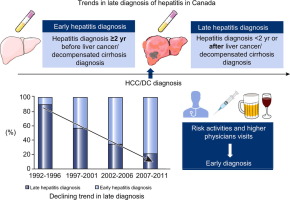当前位置:
X-MOL 学术
›
J. Hepatol.
›
论文详情
Our official English website, www.x-mol.net, welcomes your feedback! (Note: you will need to create a separate account there.)
Late hepatitis B and C diagnosis in relation to disease decompensation and hepatocellular carcinoma development
Journal of Hepatology ( IF 25.7 ) Pub Date : 2017-11-01 , DOI: 10.1016/j.jhep.2017.06.025 Hasina Samji , Amanda Yu , Margot Kuo , Maryam Alavi , Ryan Woods , Maria Alvarez , Gregory J. Dore , Mark Tyndall , Mel Krajden , Naveed Z. Janjua
Journal of Hepatology ( IF 25.7 ) Pub Date : 2017-11-01 , DOI: 10.1016/j.jhep.2017.06.025 Hasina Samji , Amanda Yu , Margot Kuo , Maryam Alavi , Ryan Woods , Maria Alvarez , Gregory J. Dore , Mark Tyndall , Mel Krajden , Naveed Z. Janjua

|
BACKGROUND & AIMS
We measured the timing of hepatitis B virus (HBV) and hepatitis C virus (HCV) diagnoses relative to the detection of decompensated cirrhosis (DC) and hepatocellular carcinoma (HCC) as an indicator of late hepatitis diagnosis. METHODS
HBV and HCV diagnoses were defined relative to the diagnosis of DC or HCC such that HBV/HCV diagnoses within two years prior, at the time of or after HCC or DC diagnosis were considered late. We performed multivariable logistic regression to assess factors associated with late HBV/HCV diagnoses among those with DC or HCC. RESULTS
From 1990 to 2012, 778/32,664 HBV cases (2.4%) and 3,925/57,866 HCV cases (6.8%) developed DC while 628/32,644 HBV cases (1.9%) and 902/57,866 HCV cases (1.6%) developed HCC. Among HBV and HCV cases with DC, 49% and 40% respectively were late diagnoses, as were 46% and 31% of HBV and HCV cases with HCC, respectively. HBV late diagnosis declined from 100% in 1992 to 11% and 26% in 2011, while HCV late diagnosis declined from 100% in 1992 to 16% and 14% in 2011 for DC and HCC respectively. In multivariable modelling, late HBV diagnosis was associated with mental illness and a fewer number of physician visits in the five years prior to HBV diagnosis. Late HCV diagnosis was also associated with fewer physician visits, while those with illicit drug use were less likely to be diagnosed late. CONCLUSIONS
The proportion of late diagnoses has declined over time. People with better engagement with the healthcare system and with risk activities were diagnosed earlier. Lay summary: Late diagnosis of HBV and HCV represents a missed opportunity to reduce the risk of serious liver disease. Our results identify successes in earlier diagnosis over time using risk-based testing as well as groups that are being missed for screening such as those who do not see a physician regularly and those with serious mental illness.
中文翻译:

与疾病失代偿和肝细胞癌发展相关的晚期乙型和丙型肝炎诊断
背景和目的 我们测量了乙型肝炎病毒 (HBV) 和丙型肝炎病毒 (HCV) 诊断相对于失代偿性肝硬化 (DC) 和肝细胞癌 (HCC) 的检测时间,作为晚期肝炎诊断的指标。方法 HBV 和 HCV 的诊断是相对于 DC 或 HCC 的诊断定义的,因此在 HCC 或 DC 诊断之前、当时或之后两年内的 HBV/HCV 诊断被认为是晚期。我们进行了多变量逻辑回归来评估与 DC 或 HCC 患者中晚期 HBV/HCV 诊断相关的因素。结果 从 1990 年到 2012 年,778/32,664 例 HBV 病例(2.4%)和 3,925/57,866 例 HCV 病例(6.8%)发展为 DC,而 628/32,644 例 HBV 病例(1.9%)和 902/57,866 例 HCV 病例(8616.616.616.8616.8616.8616.8616%)发展为 HCV 病例。在患有 DC 的 HBV 和 HCV 病例中,分别有 49% 和 40% 是晚期诊断,分别为 46% 和 31% 的 HBV 和 HCV 病例患有 HCC。HBV 晚期诊断率从 1992 年的 100% 下降到 2011 年的 11% 和 26%,而 DC 和 HCC 的 HCV 晚期诊断率从 1992 年的 100% 下降到 2011 年的 16% 和 14%。在多变量模型中,晚期 HBV 诊断与精神疾病和 HBV 诊断前五年内就诊次数减少有关。晚期 HCV 诊断也与较少的就诊次数有关,而那些使用非法药物的人较晚被诊断的可能性较小。结论 随着时间的推移,晚期诊断的比例已经下降。更早地诊断出与医疗保健系统更好地接触并参与风险活动的人。简单总结:HBV 和 HCV 的晚期诊断意味着错失了降低严重肝病风险的机会。
更新日期:2017-11-01
中文翻译:

与疾病失代偿和肝细胞癌发展相关的晚期乙型和丙型肝炎诊断
背景和目的 我们测量了乙型肝炎病毒 (HBV) 和丙型肝炎病毒 (HCV) 诊断相对于失代偿性肝硬化 (DC) 和肝细胞癌 (HCC) 的检测时间,作为晚期肝炎诊断的指标。方法 HBV 和 HCV 的诊断是相对于 DC 或 HCC 的诊断定义的,因此在 HCC 或 DC 诊断之前、当时或之后两年内的 HBV/HCV 诊断被认为是晚期。我们进行了多变量逻辑回归来评估与 DC 或 HCC 患者中晚期 HBV/HCV 诊断相关的因素。结果 从 1990 年到 2012 年,778/32,664 例 HBV 病例(2.4%)和 3,925/57,866 例 HCV 病例(6.8%)发展为 DC,而 628/32,644 例 HBV 病例(1.9%)和 902/57,866 例 HCV 病例(8616.616.616.8616.8616.8616.8616%)发展为 HCV 病例。在患有 DC 的 HBV 和 HCV 病例中,分别有 49% 和 40% 是晚期诊断,分别为 46% 和 31% 的 HBV 和 HCV 病例患有 HCC。HBV 晚期诊断率从 1992 年的 100% 下降到 2011 年的 11% 和 26%,而 DC 和 HCC 的 HCV 晚期诊断率从 1992 年的 100% 下降到 2011 年的 16% 和 14%。在多变量模型中,晚期 HBV 诊断与精神疾病和 HBV 诊断前五年内就诊次数减少有关。晚期 HCV 诊断也与较少的就诊次数有关,而那些使用非法药物的人较晚被诊断的可能性较小。结论 随着时间的推移,晚期诊断的比例已经下降。更早地诊断出与医疗保健系统更好地接触并参与风险活动的人。简单总结:HBV 和 HCV 的晚期诊断意味着错失了降低严重肝病风险的机会。



























 京公网安备 11010802027423号
京公网安备 11010802027423号